IN FISH: An Inclusive NOAA Fisheries Internship Program
NOAA’s undergraduate diversity internship program IN FISH provides internship opportunities for undergraduate students largely under-represented in the marine science and resource management fields, as well as mentorship/training opportunities to the host investigators and institutions so that they learn together with the students. Through funding provided by the CINAR minority traineeship program, the goal of IN FISH is to build diverse talent to be the future workforce of NOAA, representative of our constituency.
In 2023, CINAR investigators will again have the opportunity to participate in this program. Undergraduate students will be recruited nationally (in the winter), and will be matched with host investigators. The internship program spans 10 weeks over the summer, and includes three main components. Students first participate in a two-week intensive course in complex systems and ecosystem dynamics, which is held at Monmouth University from June 3-17. Students then travel to their host institution to participate in an additional 8 week intensive mentor-led research or a resource management project, ending Aug 11. At the end of this research experience, students participate in a virtual Symposium to present their research experience. Career and cohort building activities are offered throughout, which also includes mentorship training for the investigators hosting students.
Last year, CINAR supported five students who were mentored by CINAR investigators at UMCES, UMaine, Rutgers, and UMES. They were part of a broader cohort of 15 students participating.
CINAR 2022 IN FISH Students Share Insights
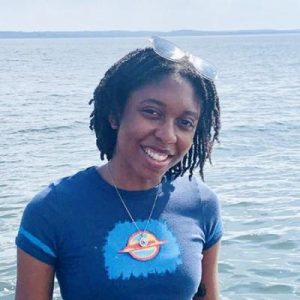
Lael Collins (She/Her/Hers)
Major: Environmental studies, University of North Carolina at Wilmington in Wilmington, North Carolina
Hometown: Charlotte, North Carolina
Internship Mentor: Michael Wilberg, University of Maryland Center for Environmental Science’s Chesapeake Biological Laboratory
Project: I’ve been looking at the population abundance and mortality of striped bass along the East Coast of the United States and developing indices of abundance for these populations. One of the challenges with striped bass survey data is that there are several surveys spanning multiple states and using different sampling methods. The goal is to find a more universal method for tracking striped bass across all the states that have a fishery.
Insight: One of the greatest takeaways from this program is the diversity, not only in the students, but also in topics. We’re all students in some sort of STEM field, mostly centering around biology, environmental science, or marine sciences. That means there are a wide variety of projects that we can take part in to expand our knowledge and interests. IN FISH also provided lots of hands-on opportunities which helped me hone my fieldwork skills and grow as a student of ecology.
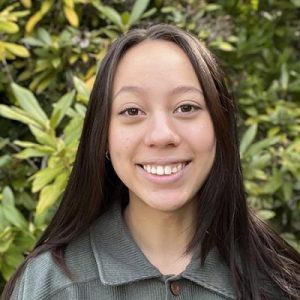
Camille Cube (She/Her/Hers)
Major: Environmental science and resource management, University of Washington in Seattle, Washington
Hometown: Falls Church, Virginia
Internship Mentor: Daniel Cullen, University of Maryland Eastern Shore
Project: I’m examining the habitat distribution of Jonah crab and Atlantic rock in this region. I am using ArcGIS to create maps of their distributions. I’m also conducting “hot spot” analyses, an ArcGIS tool to look at cluster patterns. I’m using it to see where there are high crab observations (hot spots) or low crab observations (cold spots) along the Atlantic Coast. This research will contribute to Jonah and Atlantic rock crab stock assessments in this region.
Insight: This internship has taught me how to think in systems and to notice systems everywhere in our lives. I’m learning a lot about how systems thinking is important for managing natural resources, especially for NOAA scientists. This Program is opening my eyes to graduate school opportunities and all the possibilities in science that lie ahead.
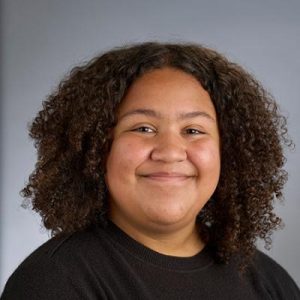
Hannah Jarvis (She/Her/Hers)
Major: Environmental studies, Dartmouth College in Hanover, New Hampshire
Hometown: Beverly, Massachusetts
Internship Mentor: Joshua Stoll, University of Maine
Project: Social vulnerability and resilience affect a community’s ability to respond and adapt to change. Resilient communities are able to cope with external stresses and disturbances from social, political, and environmental change. For my project, I’ve been developing socioeconomic indicators of fishery resilience within the Maine lobster fishery. The goal of these indicators is to detect early signs of vulnerability among coastal communities and lobster harvesters. I’ve been focusing on business investments in particular, looking at how fishermen invest in their businesses through things like boat and equipment purchases and licensing.
Insight: The IN FISH Program has taught me a lot about the multidisciplinary world of marine and oceanic sciences. I’ve gained experience with the technical aspects of my project, like using a statistical computing and graphics software called R and R Shiny to create an interactive web app. I’ve also gained insight into policy and industry through trips to different universities, laboratories, and organizations. I now have a much deeper and more well-rounded understanding of the world of marine and oceanic sciences, and this experience has helped me consider the work I’ve been involved in as a career path. Learn more about Hannah's intern experience in her blog.
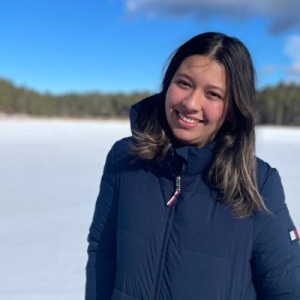
Charlene Pérez-Santos (She/Her/Hers)
Major: Marine biology, University of Puerto Rico Humacao in Humacao, Puerto Rico
Hometown: Camuy, Puerto Rico
Internship Mentors: Joshua Stoll, University of Maine; Sahir Advani, University of Maine
Project: Small-scale seafood producers face a range of threats, including competition with cheap imports. Direct seafood marketing can help seafood producers earn more for their catch, which helps sustain their livelihoods. To better understand the number, scale, and geographic distribution of seafood producers engaged in direct marketing, I’ve been helping to develop and implement the first-ever national survey of direct marketing practices—the American Seafood Harvesters Marketing Practices Survey.
Insight: The IN FISH Program has given me the opportunity to learn about other aspects of the scientific field that are not taken into account commonly. Concepts such as statistics, economics, fisheries, software such as R, and complex systems are helping me prepare for a career in science. The communication between my mentor and the rest of the team has been amazing. They make you feel totally welcome and are willing to help you with anything you need. Connecting with people across the country has been fascinating! I’ve learned a lot about NOAA Fisheries, and the career opportunities within the agency make you appreciate what science is really about. Also, representing my community as the first Puerto Rican to join the Program makes me value this opportunity even more. And of course, if you want to network for graduate school, this is the place! Learn more about Charlene's intern experience in her blog.
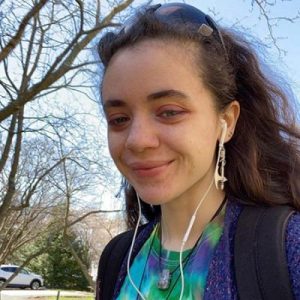
Emily Vasquez (She/Her/Hers)
Major: Marine and environmental biology and policy, Monmouth University in West Long Branch, New Jersey
Hometown: Fair Lawn, New Jersey
Internship Mentor: Katherine Mills, Gulf of Maine Research Institute
Project: My project examines fish species vulnerability assessments from waters around the world. I’ve been collecting data from scientific literature to compare the biological sensitivity and climate exposure factors used to better understand the connection between a species' biological traits and its environment. I’ve also been identifying gaps in the assessment process, especially for highly vulnerable species like diadromous fish, which migrate between freshwater rivers and the ocean. Structures like dams threaten their survival.
Insight: My time at the Gulf of Maine Research Institute has helped me better understand the complexity of fishery systems, data collection and analyses, and the collaborative nature of communicating scientific research effectively. I found purpose in communicating others’ research that was years in the making. As an IN FISH intern, I’m thankful for all the connections I’ve made and knowing I can always find someone to answer all of my questions. Tying my project into our class on ecosystem dynamics has made me excited to one day apply what I’ve learned here to a habitat restoration job.
